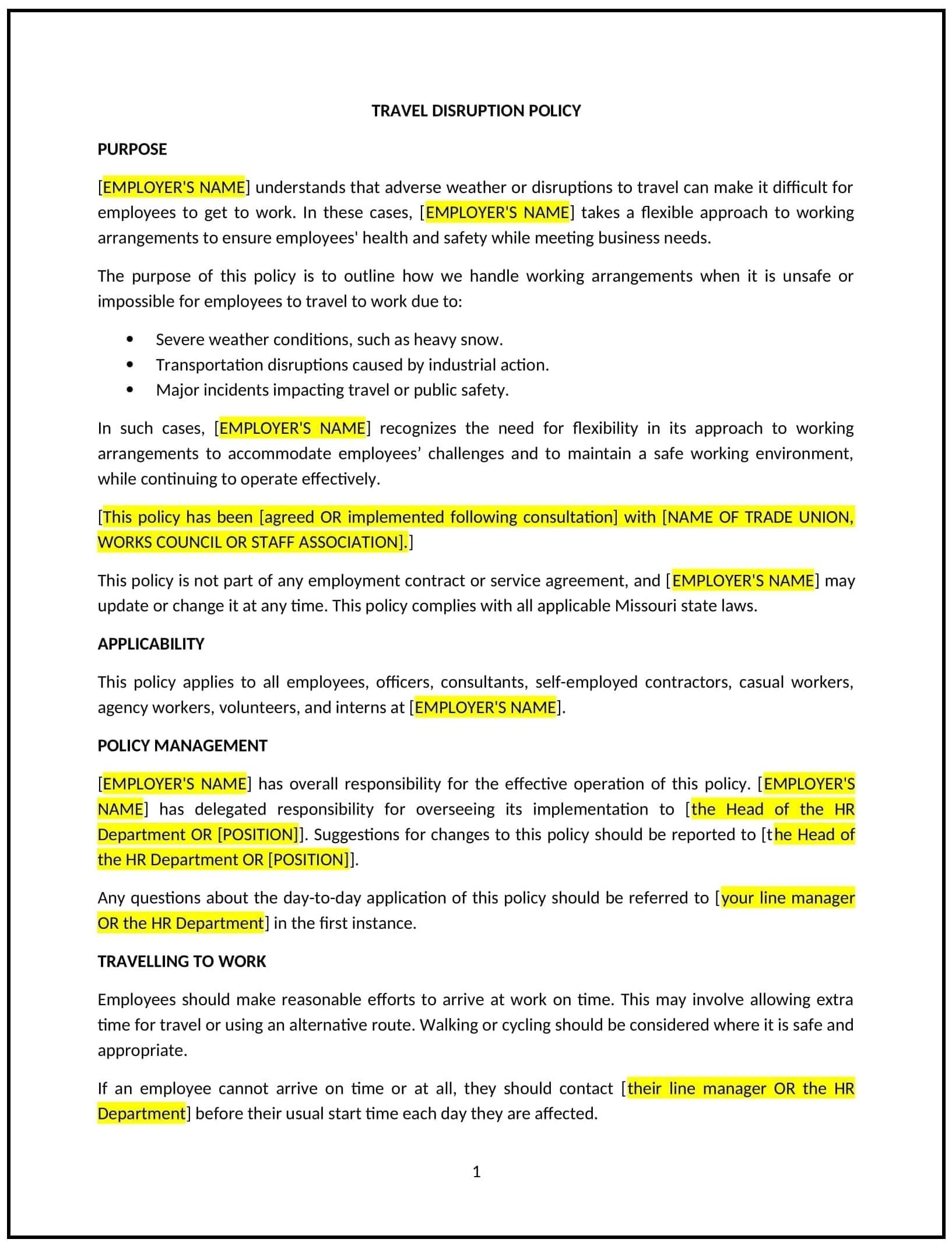Got contracts to review? While you're here for policies, let Cobrief make contract review effortless—start your free review now.

Customize this template for free
Travel disruption policy (Missouri)
A travel disruption policy helps businesses in Missouri manage situations where employee travel plans are disrupted due to factors like weather, strikes, cancellations, or other unforeseen circumstances. This policy outlines how employees should handle travel disruptions, the support the company provides during such events, and how employees can claim reimbursement for additional expenses incurred as a result. It is designed to ensure that employees are not unduly burdened by disruptions and that the business can continue to operate smoothly despite unexpected travel challenges.
By adopting this policy, businesses can minimize the impact of travel disruptions on operations, support their employees, and maintain consistency in how such situations are handled.
How to use this travel disruption policy (Missouri)
- Define eligible travel disruptions: Clearly specify what qualifies as a travel disruption under the policy, such as flight cancellations, delayed transportation, severe weather, strikes, or other unforeseen circumstances that prevent employees from reaching their destination on time.
- Set employee responsibilities: Outline what is expected from employees in the event of a travel disruption, such as notifying their manager promptly, seeking alternative travel options, and managing costs associated with delays.
- Provide support during disruptions: Detail the support the company provides to employees during travel disruptions, including assistance with rebooking flights, arranging accommodations, or reimbursing reasonable costs for meals, transportation, or lodging incurred as a result of the disruption.
- Set reimbursement guidelines: Specify which additional expenses incurred due to a travel disruption will be reimbursed, such as extra lodging, meals, or transportation. Include any limits or guidelines on what is considered reasonable.
- Establish reporting procedures: Define the process for employees to report a travel disruption, including documentation required (e.g., receipts, flight cancellations), and the timeframe for submitting claims for reimbursement.
- Clarify impact on work schedules: Address how travel disruptions may affect work schedules, including whether employees are expected to make up lost time, work remotely, or if any flexibility is provided in light of the disruption.
- Review regularly: Periodically review and update the policy to ensure it remains relevant and effective in light of changing business needs, travel practices, or Missouri state law.
Benefits of using this travel disruption policy (Missouri)
This policy provides several benefits for businesses in Missouri:
- Minimizes disruption impact: By outlining a clear plan for handling travel disruptions, businesses can minimize the operational impact caused by unexpected delays or cancellations.
- Supports employee well-being: Offering support and reimbursement during travel disruptions ensures employees are not financially burdened or stressed by issues beyond their control, helping maintain morale and trust.
- Ensures fairness and consistency: A clear policy ensures that all employees are treated equally when dealing with travel disruptions, reducing the risk of confusion or perceived favoritism.
- Protects the business’s operations: By helping employees manage travel disruptions efficiently, the company can ensure that employees arrive on time or make necessary adjustments to continue work remotely, preventing delays in critical business functions.
- Improves employee satisfaction: Knowing that the company has a clear and supportive process for managing disruptions makes employees feel valued and supported, leading to increased satisfaction and loyalty.
- Reduces financial risk: A well-defined reimbursement process ensures that employees can claim only reasonable expenses, helping businesses maintain control over additional costs incurred due to disruptions.
Tips for using this travel disruption policy (Missouri)
- Communicate the policy clearly: Ensure that employees are aware of the travel disruption policy and understand what to do in the event of a travel issue. This can be communicated during onboarding or shared in employee handbooks.
- Provide prompt assistance: When a disruption occurs, ensure that employees know how to contact the company for assistance, whether that be for rebooking flights, finding accommodations, or receiving reimbursement for additional costs.
- Track disruptions and claims: Maintain records of travel disruptions and any associated expenses submitted for reimbursement, ensuring the claims are processed promptly and according to the policy guidelines.
- Set realistic expectations: Provide employees with clear guidelines on what constitutes reasonable expenses for reimbursement, helping to avoid disputes or confusion regarding claims.
- Offer flexibility when needed: Depending on the nature of the disruption, offer flexibility to employees regarding work schedules, such as allowing remote work or adjusting deadlines, to maintain productivity while they resolve travel issues.
- Review regularly: Periodically review the policy to ensure it remains in line with business needs, travel industry changes, and Missouri state laws.